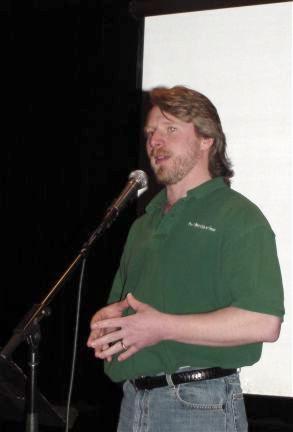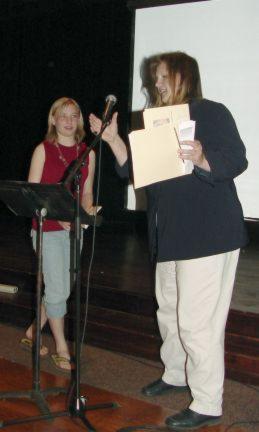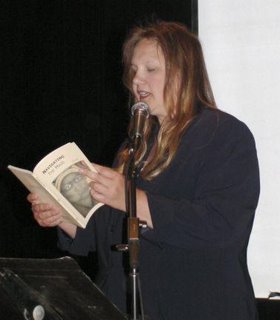The Poem is What's on the Paper
Since I became serious about poetry, I've "sweated through the fog with linguists and contenders" as Whitman said, trying to come to terms with the dichotomy between a poem on paper and the same words spoken from behind a microphone. When respected poets read poems from a page, I've sometimes cringed when the reader didn't pause appropriately follwing the period at the end of a sentence at the end of a stanza. When you're reading a short story to friends, do you pause at the end of a paragraph? Do you pause between paragraphs and before the next chapter when reading a longer effort?
. . . . . Would you believe that an inordinate percentage of students I've asked to read aloud from prose in middle and high school don't even pause at a period (.) before reading what follows? This incapacity to understand the purpose (or perpus, if you're a less-educated middle school student or president of the United States) of a simple period drives me nuts, the way the disinclination of more practiced adults burns me at poetry readings. But I digress . . . .
. . . . . If you've not yet subscribed to the email version of The Writer's Almanac -- Garrison Keillor's wonderful effort -- I urge you to do so when you finish reading this ramble. If you're as smart as I hope you are, you'll figure out how. The email and radio show program (a few minutes every weekday on WUIS-FM (91 9 as the station on-air people have taken to mis-stating it over the last year or 91.9 if you have more than dirty cotton between your ears) has made me a better poet and a better hummin' bean. Here's the point in telling you this:
. . . . the May 26 email included a poem entitled "The Lost House" by David Mason. This is a wonderful poem, and if I could share it with you here without getting arrested, I would. Google David Mason as I intend to do, and you'll probably find more about him.
. . . . The poem is exquisite, a joy, a revelation, 24 lines (six stanzas) long. The enjambment between the lines are masterstrokes. I didn't even notice it until I had read the poem about six times and begun to decide it was an excellent poem. But I realized, as I appreciated Mason's technique, that pausing between stanzas, is the oral technique of the sadly misinformed. So here's the NEWS: The poem is a poem only on the page. Here is where it is a poem. ANYWHERE else it is a poem READ or RECITED, but it is NOT A POEM. Is the tuna in the ocean a fish? YES!
. . . . . Is the tuna in my noodley cassarole a tuna? NO! It is a tuna on a plate, but it is NOT A TUNA.
. . . . . What does this mean for readers and reciters? It means that reciters should pay as much attention to the structure of the poem on the page as we consider the genealogy of the fish.
. . . . . Understanding this FREES the reader/reciter (or FREE'S the reader/reciter if you're an under-educated middle school student or a president of the United Snakes) from allowing himself and herself from being distracted by concerns that are irrelevant. The result? The likelihood of your audience understanding the poem are multiplied bigtime! And if leading your audience to understanding what the poet said is not the point of your sharing aloud, if being aloof, mysterious, hauntingly and convincingly modern-poet-like, you should rethink why you open your granola intake port.
. . . . . Poetry shared aloud is a revelatory, affirming, illuminating catharsis for intelligent people who have poetry inside. By not hobbling the process by paying attention to the physical appearance of the poem on the page -- all the while paying attention to upper case usage (WHEN THERE ARE occasional worlds begun or STATED in Upper case), punctuation (or making your own punctuation up as the author intended you to do when eschewing it during the creative process -- and concentrating on the point of the poem, you affirm your validity as a poet and speaker of poetry, and you will bring new poetry advocates into this wonderful and nutty-wild world. I hope that is your goal for poetry. I am happy to state for the record that it is mine.
. . . . . Would you believe that an inordinate percentage of students I've asked to read aloud from prose in middle and high school don't even pause at a period (.) before reading what follows? This incapacity to understand the purpose (or perpus, if you're a less-educated middle school student or president of the United States) of a simple period drives me nuts, the way the disinclination of more practiced adults burns me at poetry readings. But I digress . . . .
. . . . . If you've not yet subscribed to the email version of The Writer's Almanac -- Garrison Keillor's wonderful effort -- I urge you to do so when you finish reading this ramble. If you're as smart as I hope you are, you'll figure out how. The email and radio show program (a few minutes every weekday on WUIS-FM (91 9 as the station on-air people have taken to mis-stating it over the last year or 91.9 if you have more than dirty cotton between your ears) has made me a better poet and a better hummin' bean. Here's the point in telling you this:
. . . . the May 26 email included a poem entitled "The Lost House" by David Mason. This is a wonderful poem, and if I could share it with you here without getting arrested, I would. Google David Mason as I intend to do, and you'll probably find more about him.
. . . . The poem is exquisite, a joy, a revelation, 24 lines (six stanzas) long. The enjambment between the lines are masterstrokes. I didn't even notice it until I had read the poem about six times and begun to decide it was an excellent poem. But I realized, as I appreciated Mason's technique, that pausing between stanzas, is the oral technique of the sadly misinformed. So here's the NEWS: The poem is a poem only on the page. Here is where it is a poem. ANYWHERE else it is a poem READ or RECITED, but it is NOT A POEM. Is the tuna in the ocean a fish? YES!
. . . . . Is the tuna in my noodley cassarole a tuna? NO! It is a tuna on a plate, but it is NOT A TUNA.
. . . . . What does this mean for readers and reciters? It means that reciters should pay as much attention to the structure of the poem on the page as we consider the genealogy of the fish.
. . . . . Understanding this FREES the reader/reciter (or FREE'S the reader/reciter if you're an under-educated middle school student or a president of the United Snakes) from allowing himself and herself from being distracted by concerns that are irrelevant. The result? The likelihood of your audience understanding the poem are multiplied bigtime! And if leading your audience to understanding what the poet said is not the point of your sharing aloud, if being aloof, mysterious, hauntingly and convincingly modern-poet-like, you should rethink why you open your granola intake port.
. . . . . Poetry shared aloud is a revelatory, affirming, illuminating catharsis for intelligent people who have poetry inside. By not hobbling the process by paying attention to the physical appearance of the poem on the page -- all the while paying attention to upper case usage (WHEN THERE ARE occasional worlds begun or STATED in Upper case), punctuation (or making your own punctuation up as the author intended you to do when eschewing it during the creative process -- and concentrating on the point of the poem, you affirm your validity as a poet and speaker of poetry, and you will bring new poetry advocates into this wonderful and nutty-wild world. I hope that is your goal for poetry. I am happy to state for the record that it is mine.




